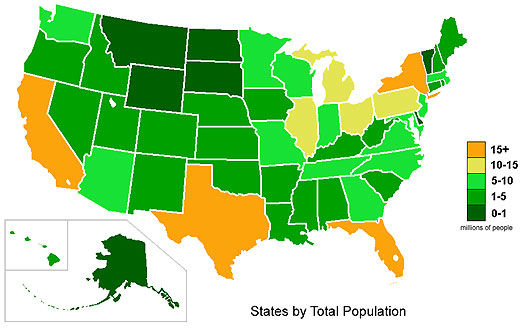
The United States is supposed to be a democracy but is it really?
If we live in a country where some citizens’ votes count more than others – in other words, in which “one person, one vote” is really not the standard – how can we claim to be a real democratic state? At best we have a limited and imperfect democracy.
It seems that having been set up as a “republic” we have just the sort of government that does not work on the one-person one-vote principle. A recent article in ScienceDaily (“Not all Citizens’ Votes Created Equal, and Study Says It Shows in Funding” 5-28-11) points out that many democracies have been set up to water down the power of the vote, denying the idea of equal distribution of voting rights based on the one-person one-vote formula.
Here is just one example: California has 66 times the number of people as Wyoming yet they both have two U.S. senators. Considering the power of the Senate, how is it democracy when states with little populations can block the will of the people in states with large populations? In fact, the Senate was deliberately created to block the popular will (originally the people did not even get to vote for their senators).
ScienceDaily reports that these disproportions become really important when it comes to the distribution of money (and goods and services).
The study looked at long-term (decades) trends in nine different federal-type republics, including the U.S., along with Argentina, Australia, Brazil, Canada, Germany, Mexico, Spain and Switzerland.
“Other things being equal, the most over-represented states or provinces can expect to receive more than twice the federal spending as the most under-represented states or provinces,” says University of Illinois political science professor Tiberiu Dragu, who shared authorship of the study with his counterpart at Stanford Jonathan Rodden. The disparity in some South American examples was 5 to 1.
While other factors may be at work, Dr. Dragu says that the unfair voting arrangements “cannot be explained away, the story remains the same: Representatives of over-represented provinces are able to bargain for a disproportionate share of the budget.”
I know of at least two states where this happens; readers can no doubt supply other examples from where they live. The taxes collected from the people of New York City go to support less populous upstate New York as the city receives less than is taken from it. The people in more densely populated South Florida are also taxed for the benefit of the less populous northern part of the state.
This is a very widespread practice in republics. The authors write: “Our analysis indicates that the rules of representation are indeed highly consequential. Controlling for a variety of country- and province-level factors and using a variety of estimation techniques, we show that overrepresented provinces in political unions around the world are rather dramatically favored in the distribution of resources.”
Most people seem to just accept these conditions as the result of historical events in the past, especially at the founding of the republics or political unions. Nevertheless they are unfair and undemocratic and people serious about democratic and human rights must try to correct these imbalances.
Dr. Dragu ends by saying, “An important question is whether the stability of such federations is threatened if citizens of under-represented regions – or ethnic groups, or countries – must provide large, permanent subsidies to those with greater representation.”
Well, what are we to support: practical politics or justice?
Image: USA states population, in millions of people, as listed on wikipedia:List of U.S. states by population This file is licensed under the Creative Commons Attribution-Share Alike 3.0 Unported license.

MOST POPULAR TODAY

High Court essentially bans demonstrations, freedom of assembly in Deep South

Resource wars rage in eastern Congo, but U.S. capitalism only sees investment opportunity

U.S. imperialism’s ‘ironclad’ support for Israel increases fascist danger at home


UN warns that Israel is still blocking humanitarian aid to Gaza






Comments